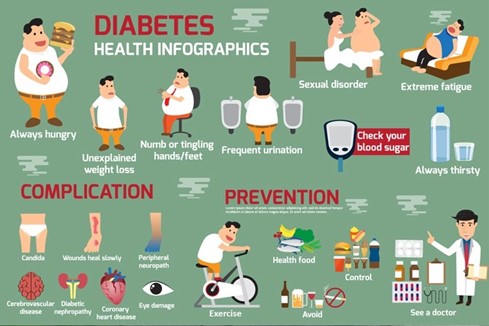The nurse is caring for a patient with newly diagnosed type I diabetes. What information is essential to include inpatient teaching before the patient is discharged from the hospital?
(Select all that apply)
use of a portable blood glucose monitor.
Hypoglycemia prevention, symptoms. and treatment.
Insulin administration.
Elimination of sugar from the diet.
Correct Answer : A,B,C,D
Use of a portable blood glucose monitor: The patient should be taught how to use a portable blood glucose monitor to check their blood glucose levels at home. This will help the patient monitor their blood glucose levels and adjust their insulin dose as necessary.
Hypoglycemia prevention, symptoms, and treatment: The patient should be taught about the signs and symptoms of hypoglycemia (low blood glucose levels) and how to treat it. This includes teaching the patient to consume 15-20 grams of fast-acting carbohydrates such as glucose tablets or juice when experiencing hypoglycemia.
Insulin administration: The patient should be taught how to administer insulin, including the timing of injections and rotating injection sites. The patient should also be educated about the importance of taking insulin regularly and the potential consequences of missed doses.
Diet: The patient should be educated about healthy eating habits that include monitoring carbohydrate intake, eating regular meals, and spacing carbohydrates throughout the day. The patient does not need to eliminate sugar entirely from their diet, but rather to consume it in moderation and balance it with other food groups.
Physical activity: The patient should be encouraged to engage in regular physical activity but may need to adjust their insulin dose or carbohydrate intake to accommodate for the changes in blood glucose levels that may result from physical activity. Reducing physical activity is not necessary, but rather adjusting to it properly with proper monitoring of glucose levels.

Nursing Test Bank
Naxlex Comprehensive Predictor Exams
Related Questions
Correct Answer is B
Explanation
The correct action for the nurse to take first when preparing to teach a newly diagnosed 43-year-old man with type 2 diabetes home management of the disease is to assess the patient's perception of what it means to have diabetes. This will help the nurse to identify any misconceptions or fears the patient may have about the condition, and tailor the education to meet the patient's specific needs. Options A, C, and D are important components of diabetes education but can be addressed after the nurse has assessed the patient's perception of the disease.
Correct Answer is D
Explanation
Cushing syndrome is caused by excessive cortisol production by the adrenal glands, which can result in weight gain and redistribution of fat to the abdomen, giving it a characteristic rounded appearance.
The other options mentioned in the question are not typically associated with Cushing syndrome. Chronically low blood pressure is not typically seen in Cushing syndrome, as cortisol is a hormone that can raise blood pressure. A bronzed appearance of the skin is more commonly seen in conditions like Addison's disease, where there is a deficiency of cortisol. Decreased axillary and pubic hair is not a common finding in Cushing syndrome, although excessive hair growth (hirsutism) may occur due to the excess of androgens produced by the adrenal glands.

Whether you are a student looking to ace your exams or a practicing nurse seeking to enhance your expertise , our nursing education contents will empower you with the confidence and competence to make a difference in the lives of patients and become a respected leader in the healthcare field.
Visit Naxlex, invest in your future and unlock endless possibilities with our unparalleled nursing education contents today
Report Wrong Answer on the Current Question
Do you disagree with the answer? If yes, what is your expected answer? Explain.
Kindly be descriptive with the issue you are facing.
